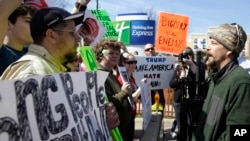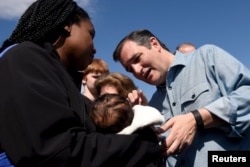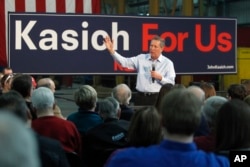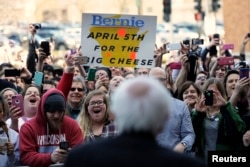In his poem "The Waste Land," T.S. Eliot noted that "April is the cruelest month." That admonition could also apply to the U.S. presidential race and the coming primaries next month that begin with the April 5 showdown in Wisconsin.
Wisconsin looms as a major test in the Republican race, where front-runner Donald Trump looks to put more distance between himself and challengers Ted Cruz and John Kasich.
A new distraction for Trump
The Trump campaign suffered a potential setback Tuesday when police in Florida charged campaign manager Corey Lewandowski with simple battery in connection with an incident involving a reporter during a campaign event March 8.
Lewandowski was ordered to appear before a judge May 4 in connection with the charge. Police released a new surveillance video that appears to show Lewandowski grabbing the arm of reporter Michelle Fields, who then worked for Breitbart News. A Trump campaign statement said Lewandowski is "absolutely innocent" of the charge.
The police action against Lewandowski is the latest distraction for the Trump campaign, which in recent weeks has had to deal with protesters at some of its rallies and some Trump supporters who physically lashed out at protesters trying to disrupt the events.
Cruz looks to break through
In the battle for Wisconsin, Cruz received a boost Tuesday with the endorsement of the state's governor, Scott Walker. Walker was one of the early victims of the Trump surge in the Republican primary race and his popularity has ebbed quite a bit from what it was a few years ago. Walker's support, however, could help Cruz in the Badger State in what recent polls suggest is a close race between the Texas senator and Trump.
After Wisconsin, the April calendar features the New York primary on the 19th and five northeastern primaries on April 26: Connecticut, Delaware, Maryland, Pennsylvania and Rhode Island. Recent polls suggest Trump should do well in most of these states, although he could split delegates with Cruz and Kasich. Kasich hopes his Pennsylvania roots will boost his delegate count — he grew up in McKees Rocks, an industrial town not far from Pittsburgh.
Cruz supporters and many of those who want to block Trump are growing increasingly impatient with Kasich and his decision to stay in the race even though he has won only one primary — his home state of Ohio.
Anti-Trump forces look to convention
The anti-Trump strategy remains focused on denying the New York billionaire the number of delegates he needs to claim the Republican nomination in advance of the national nominating convention in Cleveland in July.
The latest Associated Press tally has Trump with 739 delegates, followed by Cruz with 465 and Kasich with 143. It takes 1,237 delegates to clinch the Republican nomination, and it's still unclear whether Trump will be able to reach that number before the convention.
If not, Republicans may be looking at their first contested convention in 40 years, and uncertainty about the outcome will grow with each additional ballot.
Most Republican delegates are committed to one of the candidates based on primary or caucus results in their state on the first ballot. After that, however, increasing numbers of delegates would be free to support whomever they please.
Trump has warned that any attempt to take the nomination away from him at the convention would lead to chaos. So far, that has not stopped establishment Republicans from taking a hard look at how Trump might be stopped at the convention and who the party might turn to instead.
Sanders looks to build on recent victories
In the Democratic race, Bernie Sanders is trying to build momentum off his recent victories in caucus votes in Alaska, Hawaii and Washington state. Sanders defeated front-runner Hillary Clinton by huge margins in those states, continuing a pattern of doing well in smaller caucus contests dominated by white progressive Democrats and younger voters.
Clinton has done better in larger, more diverse states such as Florida, Illinois and Ohio.
Sanders hopes for a strong showing Tuesday in Wisconsin that would cause Democratic delegates to question Clinton's ability to secure the Democratic nomination.
Clinton wants to pivot her focus to the Republicans, but Sanders has proven to be persistent and resourceful — raising about $4 million since his most recent victories in western states.
The latest AP delegate tally has Clinton at 1,234 and Sanders trailing with 956.
Clinton's lead grows considerably when her support among the so-called Democratic "super-delegates" is added. That puts Clinton at 1,703, roughly 70 percent of the 2,383 needed to secure the Democratic nomination.
Her lead among super-delegates also means that Sanders would have to win about 67 percent of the remaining delegates at stake to win the nomination, a difficult task under Democratic Party rules that allocate delegates from primaries and caucuses on a proportional basis.
Sanders has asked for another debate with Clinton and says his campaign is actively trying to win over super-delegates who are already committed to Clinton. Her supporters hope to have a firmer grip on the Democratic nomination by the end of April after primaries in New York and Pennsylvania, where the former secretary of state is favored.



